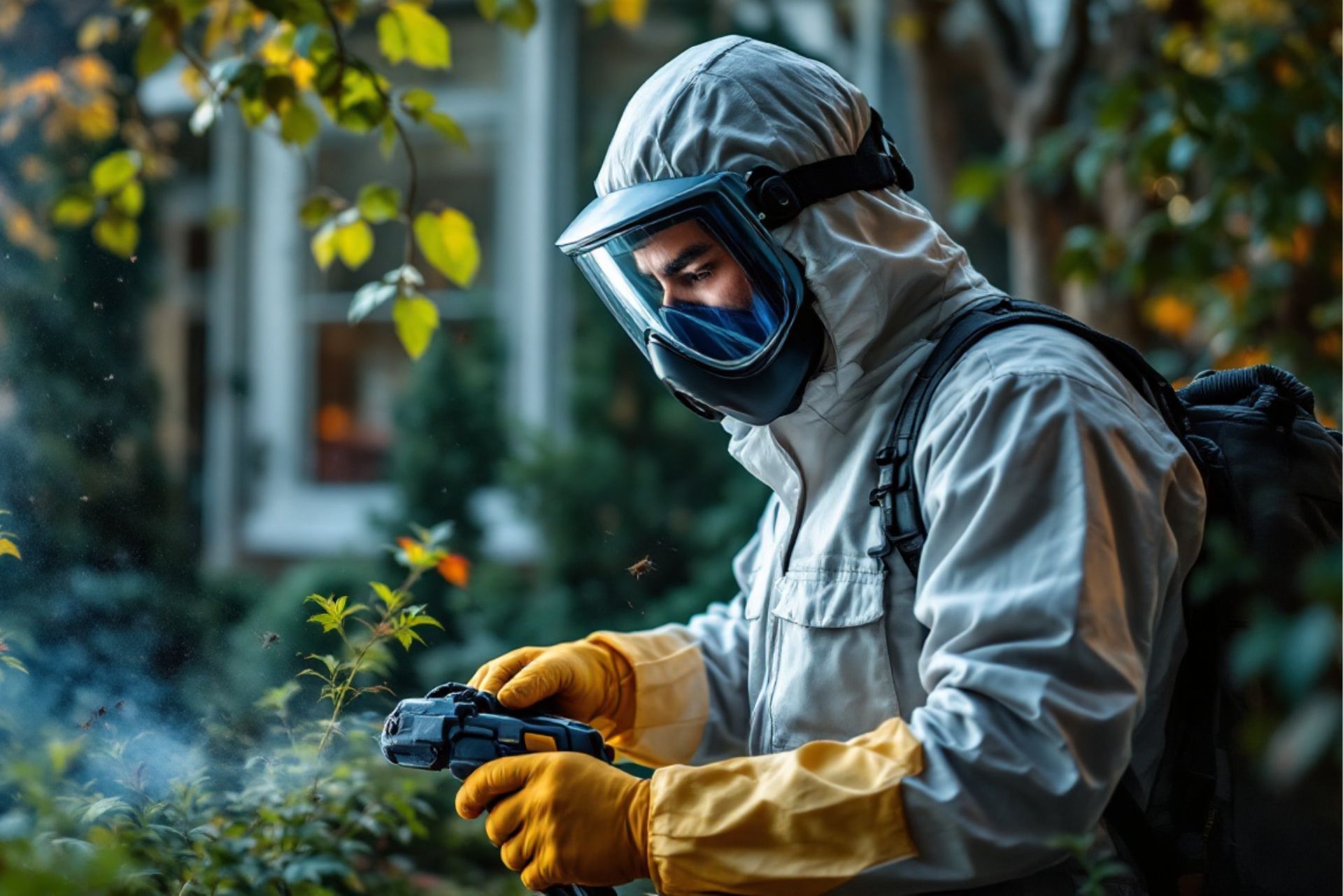
Most Common Business Policies
Index
Contact Us
Pest control is a vital service that protects homes and businesses from unwanted infestations. In Arizona, a state known for its diverse wildlife and warm climate, pest control companies play a crucial role in maintaining safe and healthy environments. However, like any business, pest control operators face risks that can lead to significant financial losses. This is where pest control insurance comes into play. Understanding the ins and outs of pest control insurance in Arizona is essential for business owners in this industry.
Understanding Pest Control Insurance
Pest control insurance is a specialized form of coverage designed to protect pest control businesses from various risks associated with their operations. This insurance typically includes general liability, property coverage, and commercial auto insurance, among other policies. Each of these components serves a unique purpose and is essential for comprehensive protection.
Types of Coverage
There are several types of insurance coverage that pest control companies should consider. Each type addresses specific risks that may arise during the course of business operations.
- General Liability Insurance: This is the most fundamental type of insurance for any business. It protects against claims of bodily injury or property damage that may occur as a result of your services. For example, if a technician accidentally damages a client's property while performing pest control services, this insurance can cover the costs associated with the damage.
- Professional Liability Insurance: Also known as errors and omissions insurance, this coverage protects against claims arising from negligence or failure to deliver promised services. If a pest control company fails to eliminate a pest problem and the client suffers damages as a result, this insurance can help cover legal fees and settlements.
- Commercial Auto Insurance: For pest control businesses that utilize vehicles for service calls, commercial auto insurance is essential. This coverage protects against accidents involving company vehicles, ensuring that both the driver and any third parties are covered in the event of an incident.
The Importance of Coverage
Having the right insurance coverage is not just a legal requirement; it also provides peace of mind. With the right policies in place, pest control companies can focus on their core operations without the constant worry of potential financial liabilities. Additionally, clients are more likely to trust a pest control company that is adequately insured, as it demonstrates a commitment to professionalism and responsibility.
Moreover, pest control insurance can also enhance a company's reputation in a competitive market. When potential clients see that a business is insured, it signals that the company takes its responsibilities seriously and is prepared for unforeseen circumstances. This can be a significant differentiator, especially in an industry where trust is paramount. Furthermore, many commercial contracts require proof of insurance before services can commence, making it not only a protective measure but also a necessary component for business growth and sustainability.
In addition to the standard coverages, pest control companies may also want to consider additional endorsements or riders tailored to their specific needs. For instance, coverage for equipment breakdown can be crucial, as pest control often relies on specialized tools and machinery. If these tools fail, the resulting downtime can lead to significant financial losses. By investing in comprehensive insurance that includes these additional protections, businesses can safeguard their operations against a wider range of potential risks, ensuring long-term stability and success.

Legal Requirements for Pest Control Insurance in Arizona
In Arizona, pest control companies are required to carry certain types of insurance to operate legally. Understanding these legal requirements is crucial for compliance and to avoid penalties.
Licensing and Insurance Requirements
The Arizona Department of Agriculture regulates pest control businesses, and one of the requirements for obtaining a pest control license is proof of insurance. Specifically, pest control operators must have general liability insurance with a minimum coverage limit. This ensures that the company can cover any damages or injuries that occur as a result of their services.
Additionally, pest control businesses must also maintain workers' compensation insurance if they have employees. This coverage protects workers in the event of job-related injuries or illnesses, ensuring that they receive necessary medical care and compensation for lost wages. It is essential for business owners to understand that even a minor incident can lead to significant financial implications, making this insurance not just a legal requirement but a critical aspect of operating a safe and responsible business.
Consequences of Non-Compliance
Operating without the required insurance can lead to severe consequences for pest control companies. Not only can businesses face fines and penalties from regulatory bodies, but they also risk losing their operating license. Furthermore, in the event of a claim or lawsuit, a lack of insurance can leave a business owner personally liable for damages, which can be financially devastating. The repercussions extend beyond immediate financial loss; they can also damage a company's reputation and erode customer trust, which is vital in the service industry.
Moreover, the competitive landscape of pest control in Arizona necessitates that businesses not only comply with legal standards but also differentiate themselves through professionalism and reliability. Companies that can demonstrate their commitment to safety and legal compliance are more likely to attract and retain clients. This is particularly important in a state like Arizona, where pest issues can be prevalent due to the warm climate, making pest control services essential for homeowners and businesses alike. Therefore, investing in the right insurance is not just about meeting legal obligations; it is also a strategic move that can enhance a company's credibility and marketability.
Choosing the Right Insurance Provider
Selecting the right insurance provider is a critical step for any pest control business. With numerous options available, it’s essential to conduct thorough research to find a company that meets specific needs.
Factors to Consider
When evaluating potential insurance providers, several factors should be taken into account:
- Experience in the Industry: Look for insurance companies that have experience working with pest control businesses. They will better understand the unique risks and challenges faced by the industry.
- Coverage Options: Ensure that the provider offers a comprehensive range of coverage options tailored to the needs of pest control companies. This includes general liability, professional liability, and commercial auto insurance.
- Customer Service: A responsive and knowledgeable customer service team can make a significant difference when it comes to filing claims or addressing concerns. Look for providers with positive reviews regarding their customer support.
Getting Quotes
Once potential providers have been identified, obtaining quotes is the next step. It’s advisable to request quotes from multiple companies to compare coverage options and pricing. During this process, be sure to ask about any discounts that may be available, such as bundling policies or maintaining a claims-free record.
Additionally, it can be beneficial to inquire about the claims process for each provider. Understanding how quickly and efficiently a company processes claims can provide insight into their reliability. Some insurers may offer online claims submission, which can streamline the process and reduce downtime for your business. Moreover, consider the financial stability of the provider; checking their ratings through agencies like A.M. Best or Standard & Poor’s can give you an idea of their ability to pay out claims in the event of a loss.
Finally, don’t hesitate to reach out to other pest control professionals for recommendations. Networking within the industry can provide valuable insights into which insurance providers are favored and trusted by your peers. Engaging in forums or local associations can also lead to discussions about experiences with various insurers, further guiding your decision-making process. By gathering as much information as possible, you can make a more informed choice that aligns with your business’s needs and objectives.
Cost of Pest Control Insurance in Arizona
The cost of pest control insurance can vary widely based on several factors. Understanding these factors can help business owners budget appropriately and find the best coverage for their needs.
Factors Affecting Insurance Costs
Several elements can influence the cost of pest control insurance, including:
- Business Size: Larger businesses with more employees and higher revenue may face higher insurance premiums due to increased risk exposure.
- Coverage Limits: The higher the coverage limits selected, the more expensive the policy will be. It’s essential to find a balance between adequate coverage and affordability.
- Claims History: A history of frequent claims can lead to higher premiums. Insurance providers may view businesses with multiple claims as higher risk, resulting in increased costs.
Average Costs
On average, pest control insurance in Arizona can range from $500 to $2,500 annually, depending on the factors mentioned above. Smaller companies may find policies on the lower end of the spectrum, while larger operations or those with a history of claims may incur higher costs. It’s essential to shop around and compare quotes to find the best deal.
In addition to the basic factors that influence insurance costs, geographical location within Arizona can also play a significant role. For instance, urban areas with a higher density of businesses and potential clients may lead to increased competition and, consequently, more tailored insurance products. Conversely, rural areas might see lower premiums due to fewer claims and reduced risk exposure. Furthermore, the specific types of pests that a business specializes in can impact insurance rates. Companies that deal with more hazardous pests, such as termites or rodents, may face higher premiums due to the potential for property damage and liability claims.
Another important consideration for pest control businesses is the inclusion of additional coverage options, such as general liability insurance or workers' compensation. These policies can provide essential protection against lawsuits and employee injuries, but they can also increase the overall cost of insurance. Business owners should carefully assess their specific needs and risks to determine the most beneficial coverage options. Engaging with an experienced insurance broker who understands the pest control industry can also provide valuable insights and help navigate the complexities of insurance policies, ensuring that businesses are adequately protected without overspending.

Common Exclusions in Pest Control Insurance
While pest control insurance provides essential coverage, it’s important to be aware of common exclusions that may not be covered under standard policies. Understanding these exclusions can help business owners mitigate risks effectively.
Typical Exclusions
Some common exclusions found in pest control insurance policies include:
- Intentional Acts: Insurance typically does not cover damages resulting from intentional acts or gross negligence. If a pest control operator intentionally causes harm or damage, the insurance will not provide coverage.
- Contractual Liabilities: Many policies exclude liabilities that arise from contracts unless specifically agreed upon in the policy. It’s crucial to read the fine print and understand what is and isn’t covered.
- Employee Injuries: While workers' compensation insurance covers employee injuries, general liability insurance does not. Business owners must ensure they have the appropriate coverage for employee-related incidents.
Mitigating Risks
To protect against these exclusions, pest control companies should implement risk management strategies. This includes thorough employee training, proper safety protocols, and maintaining clear communication with clients about services provided. By taking proactive steps, businesses can reduce the likelihood of claims and enhance their overall safety.
Additionally, it is advisable for pest control operators to conduct regular audits of their insurance policies to ensure they are up-to-date with current industry standards and practices. Engaging with an insurance professional who specializes in pest control can provide invaluable insights into potential gaps in coverage. This expert guidance can help tailor a policy that not only meets the specific needs of the business but also addresses any unique risks associated with the pest control industry.
Furthermore, fostering a culture of safety within the organization can significantly decrease the chances of incidents that lead to claims. This can be achieved through regular safety meetings, encouraging employees to report potential hazards, and incentivizing safe practices. By prioritizing safety and compliance, pest control businesses can not only protect their employees but also build trust with their clients, ultimately leading to a more successful operation.
Claims Process for Pest Control Insurance
Understanding the claims process is essential for pest control business owners. In the event of an incident, knowing how to navigate the claims process can save time and reduce stress. This knowledge not only helps in expediting the resolution but also empowers business owners to manage their risks more effectively, ensuring that they can focus on providing quality service to their clients.
Steps to File a Claim
When a claim needs to be filed, the following steps should be taken:
- Notify the Insurance Provider: Contact the insurance company as soon as possible to report the incident. Provide them with all relevant information and documentation.
- Document the Incident: Gather evidence related to the incident, including photographs, witness statements, and any other pertinent information that may support the claim.
- Complete Necessary Forms: Fill out any required claim forms provided by the insurance company. Ensure that all information is accurate and complete to avoid delays.
Timeline for Claims
The timeline for processing claims can vary depending on the complexity of the incident and the insurance provider. Generally, simple claims may be resolved within a few weeks, while more complicated cases could take several months. Keeping open lines of communication with the insurance provider can help ensure a smoother claims process. Regular follow-ups can also keep the claim on track and demonstrate to the insurer that you are actively engaged in the resolution process.
Moreover, it's important to understand that some insurance providers may have specific timelines for different types of claims. For instance, claims related to property damage might be prioritized differently than those concerning liability issues. Being aware of these nuances can help pest control business owners set realistic expectations and prepare accordingly. Additionally, maintaining thorough records of all communications with the insurance company, including dates, times, and the names of representatives spoken to, can be invaluable should any disputes arise during the claims process.
Conclusion
Pest control insurance is an essential aspect of operating a pest control business in Arizona. With various coverage options available, understanding the legal requirements, costs, and claims process can help business owners protect their investments and ensure long-term success. By taking the time to choose the right insurance provider and implementing effective risk management strategies, pest control companies can navigate the challenges of the industry with confidence.
In a state like Arizona, where pests can thrive in the warm climate, the importance of pest control cannot be overstated. By investing in comprehensive insurance coverage, pest control businesses can safeguard their operations, protect their employees, and provide peace of mind to their clients. Ultimately, the right insurance not only supports compliance with legal requirements but also enhances the reputation and reliability of pest control services in the community.
